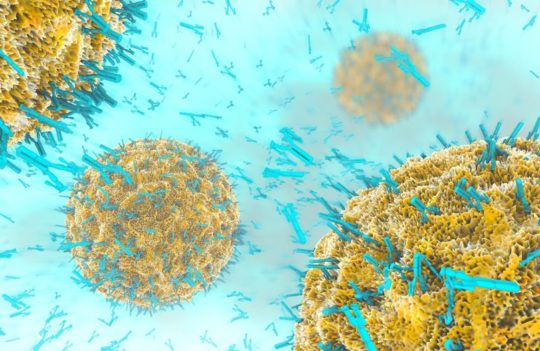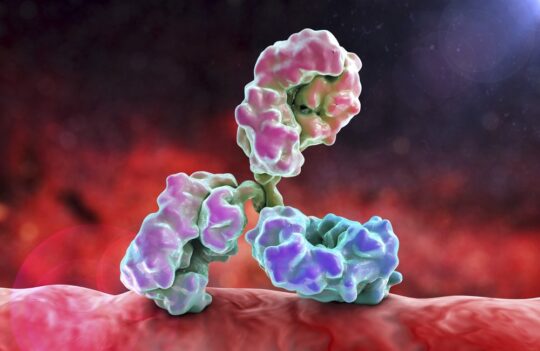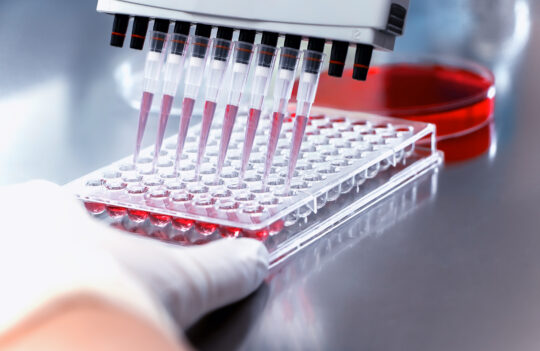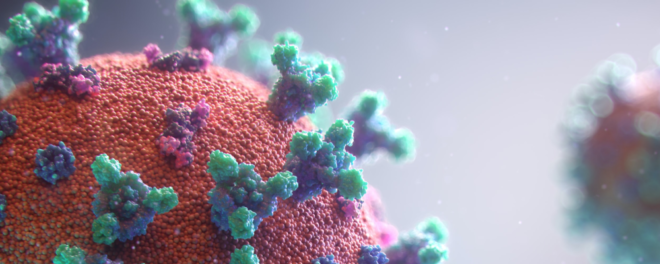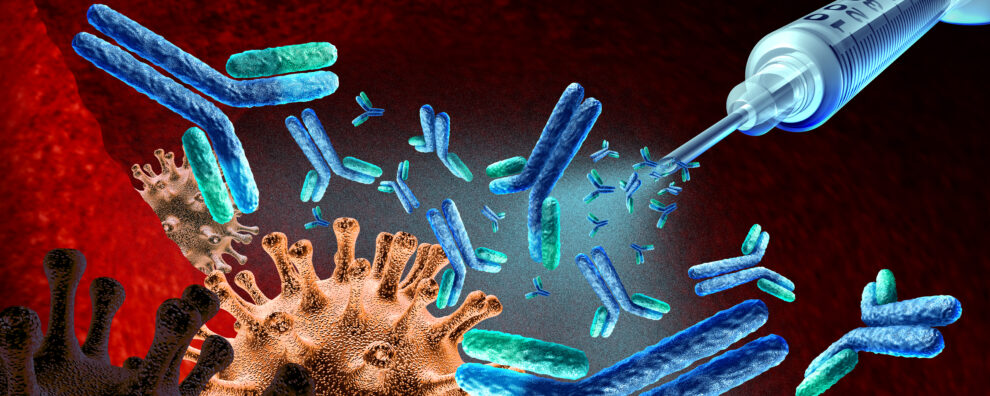 Antibody production
Antibody production
How Can Single B Cell Sorting Propel Your Antibody Discovery to New Heights?
In the ever-evolving field of biotechnology, the quest for innovative and effective antibody discovery methods is relentless. Researchers and scientists are continually seeking ways to enhance therapeutic, diagnostic, and research applications. Enter Single B Cell Sorting—a groundbreaking technology that's set to revolutionize antibody discovery. Imagine being able to isolate individual B cells with pinpoint precision, rapidly develop high-affinity antibodies, and tackle complex diseases with unprecedented accuracy. This isn't a future dream; it's the reality of Single B Cell Sorting. Curious about how this cutting-edge technology can propel your antibody discovery to new heights? In this comprehensive guide, we delve into the challenges faced in antibody development and how Single B Cell Sorting addresses them with remarkable efficiency and specificity. From therapeutic applications targeting diverse antigens to diagnostic tools with unparalleled sensitivity, and research advancements ensuring reproducibility and reliability, the potential of Single B Cell Sorting is vast. Join us as we explore the transformative power of Single B Cell Sorting and discover why ProteoGenix's expertise in this technology can be your key to unlocking groundbreaking scientific breakthroughs. Dive into this article to uncover the future of antibody discovery and see how you can harness this innovative technology for your research success.
- The Significance of Antibody Discovery
- Importance in Therapeutics, Diagnostics, and Research
- Current Landscape and Advancements
- Introduction to Single B Cell Sorting
- Brief Overview of the Technology
- Its Relevance and Growing Importance in Antibody Discovery
- Problematic Areas in Antibody Development
- Therapeutic Antibody Development
- Diagnostic Antibody Development
- Research Antibody Development
- Single B Cell Sorting: A Game Changer in Therapeutic, Diagnostic, and Research fields
- Precision and Specificity
- Efficiency and Speed
- Enhanced Diversity
- The Future of Antibody Discovery with Single B Cell Sorting
- Emerging Trends and Technologies
- ProteoGenix’s Expertise in Single B Cell Technologies
- Conclusion
- Resources
The Significance of Antibody Discovery
Importance in Therapeutics, Diagnostics, and Research
Antibody discovery is a cornerstone of modern biomedical science, offering unparalleled potential in therapeutics, diagnostics, and fundamental research. Antibodies, also known as immunoglobulins, are Y-shaped proteins produced by B cells in the immune system. They bind specifically to antigens, such as pathogens or malignant cells, neutralizing them or marking them for destruction by other immune cells. This specific binding capability makes antibodies indispensable tools across multiple domains.
Therapeutics: The development of monoclonal antibodies (mAbs) has revolutionized therapeutic strategies for a variety of diseases, including cancers, autoimmune disorders, and infectious diseases. Therapeutic antibodies are engineered to target specific antigens with high precision, thereby improving treatment efficacy while minimizing off-target effects. For example, trastuzumab (Herceptin) targets the HER2 receptor in HER2-positive breast cancer, significantly improving survival rates. Similarly, pembrolizumab (Keytruda) targets the PD-1 receptor on T cells, enhancing the immune system’s ability to fight cancer.
Diagnostics: In diagnostics, antibodies are crucial for the detection of biomarkers, which are indicators of disease presence or progression. Techniques such as enzyme-linked immunosorbent assays (ELISA), immunohistochemistry (IHC), and lateral flow assays rely on antibodies for their high specificity and sensitivity. These diagnostic tools are essential for early disease detection, monitoring disease progression, and evaluating the effectiveness of treatments. For instance, rapid COVID-19 tests use antibodies to detect viral antigens, providing quick and reliable results.
Research: In research, antibodies are indispensable reagents for investigating cellular processes and molecular mechanisms. They are used in a variety of applications, including Western blotting for protein identification, flow cytometry for cell sorting and characterization, and immunoprecipitation for studying protein interactions. The use of antibodies in research facilitates the exploration of complex biological systems, contributing to our understanding of disease mechanisms and the identification of novel therapeutic targets.
Current Landscape and Advancements
The landscape of antibody discovery is continuously evolving, driven by technological advancements and a deeper understanding of immunology. Traditional methods like hybridoma technology, which involves the fusion of B cells with myeloma cells to produce monoclonal antibodies, have been foundational but are now complemented by more advanced techniques. Phage display, where bacteriophages are used to present antibody fragments and select those that bind to a specific antigen, has also been a significant step forward.
Recent advancements include next-generation sequencing (NGS) and single-cell technologies, which allow for the high-throughput sequencing of antibody genes and the detailed analysis of individual B cells. These technologies have enabled the rapid identification and characterization of antibodies, significantly speeding up the discovery process. Furthermore, the integration of artificial intelligence (AI) and machine learning (ML) into antibody discovery is transforming the field. These computational tools can predict antibody-antigen interactions, optimize antibody structures, and identify potential cross-reactivities, thereby enhancing the efficiency and precision of antibody engineering.
Recombinant antibody technologies have also advanced, allowing for the production of antibodies in various formats, such as Fab fragments, single-chain variable fragments (scFvs), and bispecific antibodies. These recombinant antibodies offer improved pharmacokinetics, reduced immunogenicity, and the ability to engage multiple targets simultaneously.
High-throughput screening methods and automated platforms have further revolutionized the field, enabling the rapid and simultaneous testing of thousands of antibody candidates. These innovations are crucial for addressing the growing demand for new therapeutics and diagnostics, particularly in the context of emerging infectious diseases and complex conditions like cancer.
Introduction to Single B Cell Sorting
Brief Overview of the Technology
Single B Cell Sorting is a cutting-edge technology that involves the isolation and analysis of individual B cells to identify and sequence the antibodies they produce. This method utilizes advanced techniques such as flow cytometry or microfluidic platforms to sort single B cells from a heterogeneous population based on specific surface markers. Once isolated, the genetic material (RNA) of these B cells is extracted and sequenced to determine the antibody’s heavy and light chain sequences.
The primary advantage of Single B Cell Sorting is its ability to capture the natural diversity of the antibody repertoire directly from an individual’s immune response. Unlike traditional methods that may miss rare but potent antibodies, Single B Cell Sorting can identify these unique antibodies, providing a more comprehensive and accurate representation of the immune response.
Its Relevance and Growing Importance in Antibody Discovery
Single B Cell Sorting has gained significant relevance in antibody discovery due to its precision, efficiency, and ability to access the natural immune repertoire. Traditional methods, such as hybridoma technology and phage display, often involve laborious and time-consuming steps with the risk of losing rare but highly potent antibodies. In contrast, Single B Cell Sorting enables the rapid and direct identification of antibodies from individual B cells, preserving the diversity and functional relevance of the natural immune response.
This technology is particularly valuable in scenarios where the immune response to a specific antigen is critical. For instance, during infectious disease outbreaks, Single B Cell Sorting can rapidly identify neutralizing antibodies against novel pathogens, facilitating the development of therapeutic antibodies and vaccines. In cancer immunotherapy, it allows for the identification of tumor-specific antibodies that can enhance the efficacy of existing treatments or lead to the development of new therapies.
Moreover, Single B Cell Sorting is instrumental in overcoming challenges related to antibody humanization and affinity maturation. The natural antibodies identified through this method often require minimal modifications to achieve the desired therapeutic properties, thereby reducing development timelines and enhancing the likelihood of clinical success.
The growing importance of Single B Cell Sorting is also reflected in its integration with other advanced technologies. For example, combining Single B Cell Sorting with next-generation sequencing and bioinformatics allows for the comprehensive analysis of the antibody repertoire, providing insights into the immune response and guiding the design of optimized antibodies. Additionally, the use of machine learning algorithms can predict the binding affinity and specificity of antibodies, further enhancing the efficiency of the discovery process.
As the field of antibody discovery continues to evolve, Single B Cell Sorting stands out as a transformative approach that propels the development of next-generation antibodies. Its application spans therapeutic, diagnostic, and research domains, offering solutions to some of the most pressing challenges in modern medicine.
Problematic Areas in Antibody Development
Therapeutic Antibody Development
Challenges in Specificity and Affinity
The development of therapeutic antibodies faces significant hurdles in achieving optimal specificity and affinity. Specificity refers to the antibody’s ability to bind exclusively to the target antigen without cross-reacting with other molecules. High affinity indicates a strong binding interaction between the antibody and its target. Both properties are crucial for therapeutic efficacy and safety.
- Technical Challenges: Achieving high specificity and affinity often requires extensive screening and engineering processes. Traditional methods, such as hybridoma and phage display, involve iterative rounds of selection and optimization, which can be laborious and time-consuming. Computational approaches and artificial intelligence are being leveraged to predict and enhance these properties, but these methods still face limitations in accurately modeling complex biological interactions.
- Off-Target Effects: Even with advanced techniques, antibodies can sometimes bind to unintended targets, leading to adverse effects. This off-target binding is particularly concerning in therapeutic applications, where safety is paramount.
Time-Consuming Processes
The development cycle for therapeutic antibodies is inherently lengthy, often taking several years from initial discovery to clinical application. This extended timeline is due to multiple stages, including antigen identification, antibody generation, preclinical testing, and clinical trials.
- Screening and Optimization: The initial stages of antibody discovery involve generating a large library of potential candidates and screening them for desired characteristics. Each candidate then undergoes optimization to enhance its properties, a process that can take months to years.
- Regulatory Approval: Obtaining regulatory approval is another significant bottleneck. Therapeutic antibodies must undergo rigorous preclinical and clinical testing to demonstrate their safety and efficacy, followed by detailed regulatory review. The stringent requirements and lengthy processes of agencies like the FDA and EMA add considerable time to the development pipeline.
Difficulty in Targeting Diverse Antigens
Targeting a wide range of antigens presents another challenge in therapeutic antibody development. Some antigens, such as those on cancer cells or infectious pathogens, exhibit high variability or mimic host proteins, complicating the identification of suitable antibody targets.
- Antigen Diversity: Diseases like cancer and viral infections often involve highly variable antigens that mutate frequently. This antigenic diversity requires the development of broad-spectrum or multiple specific antibodies to effectively target all variants.
- Autoimmunity Concerns: Targeting antigens that are similar to self-proteins raises the risk of autoimmunity. Antibodies must be carefully designed to distinguish between pathogenic and normal cells to avoid triggering autoimmune responses.
Diagnostic Antibody Development
Need for High Sensitivity and Specificity
Diagnostic antibodies must exhibit exceptional sensitivity and specificity to detect low-abundance biomarkers accurately. This requirement is crucial for early disease detection, where even small amounts of a biomarker can indicate the presence of a disease.
- Technical Limitations: Developing antibodies with high sensitivity and specificity is technically challenging. It involves fine-tuning the antibody’s binding properties to ensure it can detect minute quantities of the target antigen without cross-reacting with other substances.
- Clinical Relevance: Sensitivity and specificity directly impact the clinical relevance of diagnostic tests. False positives or negatives can lead to misdiagnosis, inappropriate treatments, and overall reduced trust in diagnostic tools.
Limited Diversity in Available Antibodies
The diversity of available diagnostic antibodies is often limited, restricting the range of detectable biomarkers. This limitation hinders the development of comprehensive diagnostic panels that can provide a holistic view of a patient’s health.
- Library Generation: Creating a diverse library of antibodies capable of recognizing a wide array of biomarkers is a resource-intensive process. It requires sophisticated techniques and extensive screening to identify antibodies with the desired specificity and sensitivity.
- Innovation in Discovery: Continuous innovation is needed to expand the repertoire of diagnostic antibodies. Techniques such as single-cell analysis and high-throughput screening are helping to identify novel antibodies, but these methods still require significant investment and development time.
Research Antibody Development
Reproducibility and Reliability Issues
Reproducibility and reliability are critical in research antibody development, yet they often pose significant challenges. Inconsistent antibody performance can compromise experimental results, leading to erroneous conclusions and wasted resources.
- Batch Variability: Antibodies produced in different batches can exhibit variability in performance, affecting the reproducibility of experiments. This issue is particularly problematic in long-term studies where consistency is essential.
- Quality Control: Ensuring high-quality antibodies requires stringent quality control measures. These measures include validating the antibody’s specificity, affinity, and stability, which can be both time-consuming and costly.
High Costs and Lengthy Development Times
The development of research antibodies is both costly and time-intensive, often requiring substantial financial investment and extended timelines.
- Resource Intensive: Generating high-quality research antibodies involves sophisticated techniques, extensive screening, and rigorous validation processes. These activities require significant resources, including specialized equipment and skilled personnel.
- Funding Constraints: Research funding is often limited, making it challenging to support the development of new antibodies. This constraint can slow down scientific progress and limit the availability of novel research tools.
Single B Cell Sorting: A Game Changer in Therapeutic, Diagnostic, and Research fields
Precision and Specificity
How Single B Cell Sorting Ensures High Specificity and Affinity
Single B Cell Sorting is a transformative technology that dramatically enhances the precision and specificity of antibody discovery. This technique isolates individual B cells that naturally produce antibodies, allowing for the direct analysis and sequencing of their genetic material. By focusing on single cells, researchers can accurately capture the natural pairing of heavy and light chains, preserving the native specificity and affinity developed by the immune system.
- High Specificity: Single B Cell Sorting begins with the isolation of B cells specific to a particular antigen using advanced flow cytometry techniques, which employ fluorescently labeled antigens to tag and sort desired cells. This ensures that antibodies derived from these B cells exhibit high specificity, binding exclusively to the target antigen without cross-reactivity.
- High Affinity: The technology captures B cells that have undergone somatic hypermutation, a natural process enhancing the binding strength of antibodies to their antigens. This results in the identification of antibodies with superior binding affinities, crucial for effective therapeutic applications by ensuring strong and prolonged interactions with targets.
Examples of Successful Targeting of Diverse Antigens
Single B Cell Sorting has been successfully applied to target a wide range of antigens, showcasing its versatility and effectiveness:
- Infectious Diseases: During the COVID-19 pandemic, Single B Cell Sorting was instrumental in rapidly identifying and developing neutralizing antibodies against SARS-CoV-2. Antibodies like bamlanivimab and casirivimab demonstrated high specificity and affinity for the virus’s spike protein, providing effective therapeutic and prophylactic solutions.
- Cancer: In oncology, Single B Cell Sorting has facilitated the discovery of antibodies targeting cancer-specific antigens. This includes antibodies against HER2 in breast cancer and PD-1/PD-L1 in various cancers, contributing to the success of therapies such as trastuzumab and pembrolizumab.
- Autoimmune Diseases: The technology has enabled the identification of antibodies targeting autoantigens, offering potential treatments for autoimmune diseases. Isolating B cells from patients with conditions like rheumatoid arthritis or lupus has led to the development of antibodies that specifically target pathogenic components without affecting healthy tissues.
Efficiency and Speed
Reduction in Time-Consuming Processes
Single B Cell Sorting significantly reduces the time-consuming processes associated with traditional antibody discovery methods. Traditional techniques, such as hybridoma technology and phage display, involve multiple rounds of screening and optimization, extending development timelines.
- Direct Isolation: Single B Cell Sorting streamlines the discovery phase by directly isolating B cells that produce desired antibodies, eliminating the need for extensive screening and reducing the overall time to identify promising candidates.
- High Throughput: Advances in microfluidics and automated platforms have enhanced the efficiency of Single B Cell Sorting. High-throughput systems can process thousands of B cells simultaneously, rapidly identifying and isolating those that produce high-affinity antibodies.
Streamlining of Antibody Discovery Workflows
Single B Cell Sorting integrates seamlessly into modern antibody discovery workflows, offering a streamlined and efficient process from start to finish:
- Integration with Sequencing Technologies: Isolated B cells’ genetic material is sequenced using next-generation sequencing (NGS) technologies, allowing rapid and accurate identification of antibody genes and facilitating subsequent cloning and expression steps.
- Reduced Iterative Rounds: By providing high-quality antibodies from the outset, Single B Cell Sorting reduces the need for iterative rounds of affinity maturation and optimization, saving time and improving the likelihood of developing clinically viable antibodies on the first attempt.
Enhanced Diversity
Increased Repertoire of Antibodies
Single B Cell Sorting significantly enhances the diversity of antibodies available for discovery and development. By isolating individual B cells, researchers can capture a broader spectrum of the antibody repertoire, including rare and unique variants that might be missed by traditional methods.
- Natural Immune Diversity: The technology leverages the natural diversity of the immune response, encompassing a wide range of antibody specificities and affinities. This diversity is particularly valuable for developing antibodies against complex or variable antigens, such as those found in infectious diseases or cancer.
Ability to Capture Rare and Unique Antibodies
The ability to capture rare and unique antibodies is one of the most compelling advantages of Single B Cell Sorting. These antibodies, often overlooked in bulk screening methods, can offer novel mechanisms of action and enhanced therapeutic potential:
- Rare Antibodies: Single B Cell Sorting can identify rare B cells producing exceptional antibodies with unique properties. These rare antibodies can provide solutions to challenging targets requiring high specificity and novel binding mechanisms.
- Unique Functionalities: By capturing the full spectrum of the immune response, Single B Cell Sorting enables the discovery of antibodies with unique functionalities, such as bispecific antibodies that engage multiple targets simultaneously or antibodies that modulate immune responses in novel ways.
The Future of Antibody Discovery with Single B Cell Sorting
Emerging Trends and Technologies
Latest Advancements and Future Directions
The field of antibody discovery is rapidly evolving, and Single B Cell Sorting stands at the forefront of these advancements. Here are some of the latest trends and future directions that are poised to shape the future of antibody discovery:
- Integration with Artificial Intelligence (AI): AI and machine learning are becoming integral to antibody discovery processes. These technologies can predict antibody-antigen interactions, optimize antibody structures for better specificity and affinity, and identify potential cross-reactivities. AI-driven platforms can analyze vast datasets generated from Single B Cell Sorting, accelerating the discovery of high-quality antibodies and providing insights into antibody function and optimization.
- High-Throughput Screening Technologies: Advances in high-throughput screening technologies are enhancing the efficiency of Single B Cell Sorting. Automated systems and microfluidic platforms can process and analyze thousands of B cells simultaneously, identifying and isolating high-affinity antibodies with unprecedented speed. These high-throughput capabilities are critical for large-scale antibody discovery projects and for rapidly responding to emerging health threats.
- Single-Cell Multi-Omics: Combining Single B Cell Sorting with multi-omics approaches, such as single-cell transcriptomics and proteomics, allows for a comprehensive analysis of individual B cells. This integrated approach provides detailed insights into the genetic, transcriptomic, and proteomic profiles of B cells, facilitating the discovery of antibodies with unique properties and mechanisms of action.
- Synthetic Biology and Bioengineering: Synthetic biology and bioengineering are being used to enhance the properties of antibodies discovered through Single B Cell Sorting. Techniques such as gene editing and synthetic gene circuits can be applied to modify and optimize antibodies for improved performance, stability, and manufacturability. These advancements enable the production of next-generation antibodies with enhanced therapeutic potential.
- Humanized Mouse Models: The use of humanized mouse models, where human immune cells are engrafted into mice, is providing a valuable tool for studying human B cell responses in vivo. These models allow researchers to apply Single B Cell Sorting to human B cells within a controlled and manipulable environment, enhancing the relevance and applicability of the discovered antibodies to human health.
ProteoGenix’s Expertise in Single B Cell Technologies
Our Services and Solutions
At ProteoGenix, we harness the power of cutting-edge single B cell technologies to provide unmatched monoclonal antibody discovery services. Our comprehensive solutions are meticulously crafted to cater to the specific needs of researchers and scientists, ensuring precision, efficiency, and success in antibody development.
- High-Throughput Single B Cell Screening: Leveraging advanced techniques such as fluorescence-activated cell sorting (FACS), we precisely isolate individual B cells. This ensures the identification of B cells producing antibodies with the highest specificity and affinity for your target antigen.
- Comprehensive Antibody Characterization: Our services include in-depth characterization of isolated antibodies, assessing their specificity, affinity, and functionality to ensure they meet the highest standards for therapeutic or diagnostic use.
- Custom Antibody Engineering: We provide custom antibody engineering services, including humanization and affinity maturation, to optimize the therapeutic potential of your monoclonal antibodies.
For more information on our services, visit our Single B Cell Sequencing Service Page.
Why Choose ProteoGenix for Single B Cell Services?
ProteoGenix distinguishes itself as a leader in single B cell technologies for a multitude of reasons:
- Fast-Tracking Research Timelines: Our innovative RocketAb protocol significantly shortens project timelines, enabling you to achieve your research milestones faster by saving up to 4 weeks.
- Optimized Resource Utilization: Our methodologies are designed to be resource-efficient, utilizing 50% less antigen compared to conventional approaches, thereby cutting costs without sacrificing quality.
- Diverse Species Options: We offer flexibility in your research model by providing monoclonal antibody development services using both mouse and rabbit species, tailored to your specific experimental needs.
- Integrity of Native Antigens: Our advanced adjuvant technology ensures the preservation of native antigen structures by promoting recognition without emulsification, maintaining the integrity of your target proteins.
- High-Affinity Antibody Guarantee: We commit to delivering a minimum of three antibody clones with a binding affinity of 10-12M, ensuring that you receive high-quality candidates for your research applications.
- Precision in B Cell Isolation: Utilizing state-of-the-art FACS technology, we precisely sort antigen-specific B cells, ensuring the selection of the most promising antibody-producing cells.
- Advanced Expression Systems: Our proprietary XtenCHO™ system supports robust and efficient antibody gene expression, facilitating high-yield and scalable production.
- Comprehensive IP Rights: We ensure full intellectual property ownership over your discoveries, providing you with complete control and security over your research outputs.
- Cutting-Edge Screening Platforms: Our high-throughput screening capabilities enable rapid and reliable identification of high-affinity antibodies, accelerating your discovery process and ensuring timely results.
How ProteoGenix Can Support Your Research
ProteoGenix is committed to supporting researchers in their antibody discovery endeavors through our state-of-the-art single B cell technologies. Here’s how we can help you achieve your research goals:
- Customized Solutions: We understand that every research project is unique. Our team of experts collaborates closely with you to design and execute customized solutions that address your specific needs and challenges.
- Expert Consultation: Our experienced scientists provide expert consultation and guidance throughout the antibody discovery process, from initial screening to final validation. We work with you every step of the way to ensure your success.
- State-of-the-Art Facilities: Our advanced laboratories and cutting-edge equipment enable us to deliver high-quality results efficiently and effectively. We stay at the forefront of technological advancements to provide you with the best possible services.
- Commitment to Quality: At ProteoGenix, quality is paramount. We adhere to stringent quality control standards to ensure that the antibodies we develop meet the highest benchmarks for specificity, affinity, and functionality.
Ready to advance your antibody discovery efforts? Partner with ProteoGenix and leverage our expertise in single B cell technologies. Visit our Single B Cell Sequencing Service Page to learn more about our services and solutions.
Book a call with our experts today to discuss your project needs and how we can help you achieve your research goals. Transform your antibody development challenges into pioneering solutions with ProteoGenix!
Conclusion
Single B Cell Sorting technology represents a significant advancement in antibody discovery, offering unparalleled precision, efficiency, and diversity. This transformative approach addresses critical challenges in therapeutic, diagnostic, and research applications by ensuring high specificity and affinity, streamlining workflows, and expanding the repertoire of antibodies.
In therapeutic development, Single B Cell Sorting enhances the efficacy and safety of treatments by isolating highly specific and high-affinity antibodies, reducing development timelines, and effectively targeting diverse antigens. For diagnostics, the technology provides high sensitivity and specificity, enabling early and accurate disease detection, while also broadening the range of detectable biomarkers. In research, it improves reproducibility and reliability, accelerates discovery processes, and reduces costs.
Emerging trends such as AI integration, high-throughput screening, single-cell multi-omics, and synthetic biology are further propelling the capabilities of Single B Cell Sorting. Combining this technology with Phage B Cell Sequencing enhances antibody discovery by providing comprehensive repertoire analysis, optimizing specificity and affinity, and accelerating development timelines.
ProteoGenix leverages state-of-the-art Single B Cell Sorting technologies to support researchers in achieving their antibody discovery goals. Offering high-throughput screening, detailed antibody characterization, and custom antibody engineering, ProteoGenix ensures high-quality results tailored to specific research needs. With a commitment to quality, resource optimization, and advanced screening capabilities, ProteoGenix is a trusted partner in transforming antibody development challenges into pioneering solutions.
By adopting Single B Cell Sorting, researchers can significantly advance their therapeutic, diagnostic, and research endeavors, ultimately contributing to improved patient outcomes and scientific innovation.

